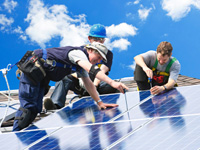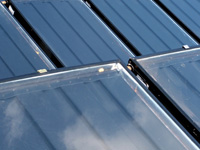
PV panels experience large amounts of damaging UV light.
Q-Lab is a world leader in weathering test equipment and test services for the wind, solar, and renewable energy industry. Long term durability of photovoltaic panels and wind turbine blades is one of the key factors in their cost competitiveness. Whether you assemble panels, manufacture modules or blades, or produce other components or materials, it is imperative that you understand the factors that degrade energy output over time.
Will your PV product last outdoors? Will your carbon-fiber composite blade survive in the North Sea? For how long? Does your new raw material supplier have the same quality as your previous one? Is your warranty backed by reliable durability data? Don't guess when you can test.
Q-Lab serves dozens of customers in multiple industries related to renewable energy such as photovoltaic panel production, including:
- Mono or multicrystalline modules
- Thin film modules
- Back sheets
- Encapsulants
- Edge Seals
- Cover Glass
- Polymeric top sheets
- Inverters
Mini-modules up to 20 x 100 cm can be tested in the QUV Accelerated Weathering Tester. Back sheets, top sheets, encapsulants, edge seals, and inverter packaging materials are also commonly tested in the QUV weathering tester because of its accurate representation of sunlight's most damaging UV energy and harsh yet realistic moisture simulation.
The Q-SUN xenon test chamber is another popular choice because of its accurate full spectrum sunlight simulation and versatile, easy-to-use flat specimen tray, which can also accommodate mini-modules up to 35 x 70 cm.
In addition, the Q-FOG cyclic corrosion tester performs a variety of salt spray and cyclic corrosion tests and meets certain IEC qualification test specifications. For testing beyond IEC qualification, an exposure that alternates between QUV and Q-FOG testers provides a robust outdoor weathering simulation for many environments.
Q-Lab's accelerated weathering and corrosion testers simulate the primary weathering conditions that degrade PV panels outdoors, allowing our customers to accurately reproduce dozens of potential failure modes, including:
- Yellowing of polymers
- Cracking
- Crazing
- Delamination
- Loss of elastic properties
- Warping
- Blistering
- Degradation in power output
- Solder bond failures
- Broken interconnects
While accelerated weathering chambers are a key weapon in the fight against the forces of sunlight, heat, and moisture, nothing beats the real thing: outdoor testing in one of Q-Lab's benchmark outdoor weathering facilities in Arizona or Florida. If you want to combine the benefits of outdoor and accelerated testing, the Q-TRAC Natural Sunlight Concentrator can provide five times the annual solar energy of an exposure in South Florida.

The wind and solar industries are experiencing rapid growth. But will future warranty issues dampen the enthusiasm?

Warranty issues are of major concern to the PV industry, especially because of potentially high product replacement and repair costs.

Photovoltaic panels on satellites have to work for many years with ultimate reliability. Testing is the only way to have confidence they will last.

Weathering testing is not just limited to the PV portion of the solar industry; the CSP and thermal side of solar also has a need to test.

Low temperature solar thermal panels can experience high failure rates due to sunlight, moisture, and temperature.

Wind turbines experience some of the harshest climates on earth - large temperature swings, salt water, wind, high UV, etc.